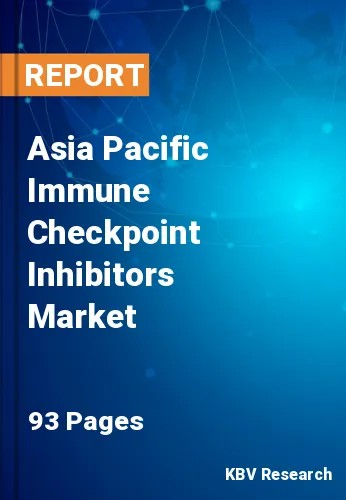The Asia Pacific Immune Checkpoint Inhibitors Market would witness market growth of 16.9% CAGR during the forecast period (2021-2027).
Immune checkpoints are important immune system regulators that help preserve self-tolerance, avoid autoimmune reactions, and reduce tissue damage by controlling the duration and severity of immune responses. In addition, immunological checkpoints are frequently abundantly expressed in cancer cells or noninvasive cells in tumor tissues. Checkpoint molecules have been explored as prospective therapeutic targets for the treatment of different types of malignancies based on extensive physiological investigations as well as preclinical and clinical trials.
The very first immune checkpoint inhibitors across the market were ipilimumab and Yervoy. Several anti-PD-1 and anti-PD-L1 antibodies have been created in response to the encouraging outcomes of Yervoy. Although other checkpoints, such as LAG-3 and TIM-3, have been explored, the only immune checkpoint inhibitors that have been licensed are CTLA-4, PD-1, and PD-L1.
Asia Pacific is undergoing constant developments in the healthcare sector. With the ongoing advancements, countries across the region are determined to establish a robust healthcare infrastructure for the treatment of various prevailing diseases. In addition, stomach cancer is one of the most common disorders across the region. The substantial existence of stomach cancer across the region is the consumption of salty and smoky edibles.
Moreover, according to the National Library of Medicine, in APAC, stomach cancer is the third most frequent cancer and the second leading cause of death from cancer. Eastern Asia has the highest incidence rates, while other sections of APAC have varying rates. Although mortality rates are gradually decreasing, they remain a significant public health issue.
The China market dominated the Asia Pacific Immune Checkpoint Inhibitors Market by Country 2020, and would continue to be a dominant market till 2027; thereby, achieving a market value of $3,563.5 million by 2027. The Japan market is estimated to grow at a CAGR of 16.2% during (2021 - 2027). Additionally, The India market would exhibit a CAGR of 17.6% during (2021 - 2027).
Based on Application, the market is segmented into Lung Cancer, Bladder Cancer, Melanoma, Hodgkin lymphoma, and others. Based on Type, the market is segmented into PD-1 Inhibitor, PD-L1 Inhibitor, and CTLA-4 Inhibitor. Based on countries, the market is segmented into China, Japan, India, South Korea, Singapore, Malaysia, and Rest of Asia Pacific.
Free Valuable Insights: The Worldwide Immune Checkpoint Inhibitors Market is Projected to reach USD 75.9 Billion by 2027, at a CAGR of 16.1%
The market research report covers the analysis of key stake holders of the market. Key companies profiled in the report include AstraZeneca PLC, Beigene Ltd., Shanghai Junshi Biosciences Co., Ltd., Bristol Myers Squibb Company, GlaxoSmithKline PLC, Eli Lilly and Company, Merck Group (Merck Sharp & Dohme Corp.), Sanofi S.A., Merck & Co., Inc., and F. Hoffmann-La Roche Ltd.
By Application
By Type
By Country
Our team of dedicated experts can provide you with attractive expansion opportunities for your business.

